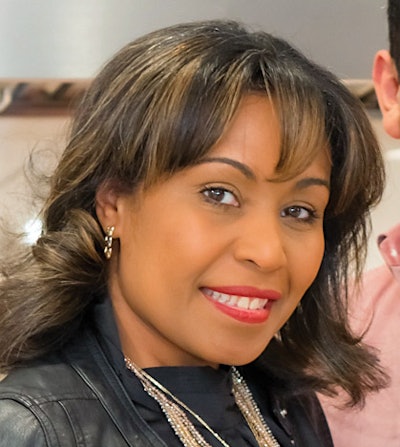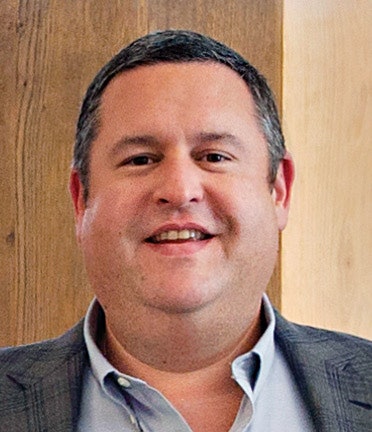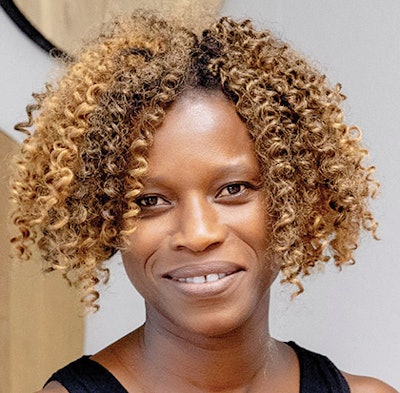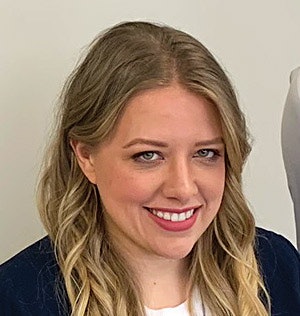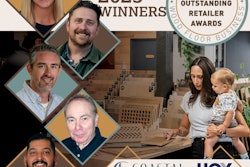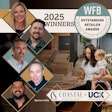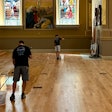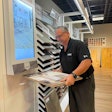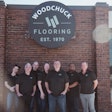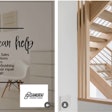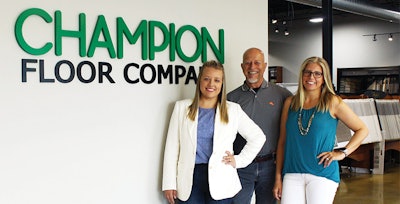
The Outstanding Retailer Awards were created last year to shine a much-needed light on wood flooring retailers who do stellar work day-in and day-out. And as the world faces unprecedented challenges and uncertainty during the COVID-19 pandemic, the industry needs thoughtful, innovative retailers paving the way now more than ever. Scroll down to read about the retailers who exemplified those qualities this year.
Does your wood flooring retail business go above and beyond? Enter the 2021 Outstanding Retailer Awards here.
Champion Floor Company | St. Louis, Mo.
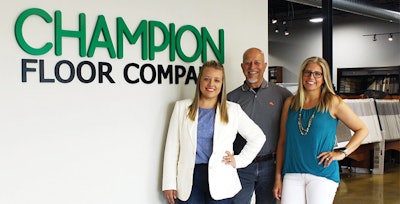
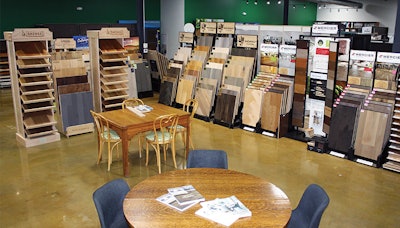
|
Year founded: 1989 Number of employees: 37 Locations: 1 Annual revenue: $4 million |
There's a saying at Champion Floor Company: "The great-looking floor is the bare minimum." The company's real success comes from building a work environment where employees can thrive, says Marketing Director Kristen Stensby.
"I want people to feel like their voices are heard and validated and that everyone is pulling in the same direction," she says.
That direction has been one of growth since the company was founded by Ralph Kuehn, who started out in sports flooring. He now runs the company with his daughters, Stensby and Kim Russ.
Kuehn originally picked the name "Champion" because it was catchy-—the kind you might associate with a sports flooring company. But as the company has evolved, it's a name the company has worked to embody, as it aims to champion its employees and clients, as well.
"We take a team approach on how we work on everything," says Russ, internal operations manager and estimator.
Champion offers full installation service, and approximately 70% of the company's revenue is from hardwood flooring. Contractors, decorators and designers make up about 40% of the company's business, Kuehn says.
And as the company has grown its clientele of high-end designers and architects, Stensby notes it's also a matter of understanding the challenges of other industries so they can help.
When it comes to the company itself, they face the same challenge most wood floor retailers do: the huge number of products available online. But it's a challenge Champion combats with product knowledge and service.
"We're not selling, we're educating," Russ says.
If a mistake ever gets made, the company sees it as an opportunity to shine. It goes back to another saying of Kuehn's: "If we are going to make mistakes, let's make them in the favor of our customers."
"That's where you really see the value," Stensby says of fixing issues big box companies might shrug off. "And those are the clients that are more likely to go back and leave a good review."
But their connection with people starts with their employees, many of whom have been with the company for more than 20 years.
"I always felt lucky that I don't have any skills," Kuehn says. The line elicits some laughs from Stensby and Russ, both familiar with Kuehn's decades of expertise. But Kuehn's serious: "That's a real holdup for a lot of people that are starting a flooring company—they're so good at what they do that they can never find anybody as good as they are."
Kuehn says finding talent and trusting in it has never been a problem.
"It just makes it much easier to grow," he says, "and my goal has always been to grow."
CIC Floors LLC | Norcross, Ga.
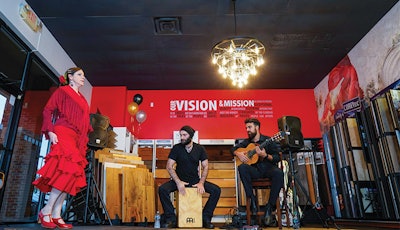

Go to an event hosted by CIC Floors, and there's a good chance you'll end up cutting a rug—but not always in the way you'd think.
The company's "Dancing in Good Floors!" networking events have become known for their music and dancing, an integral part of the company and its message: Floors are made to be enjoyed. CIC's owners, husband-and-wife team Cesar and Clara Olguin, even met while salsa dancing.
"We bring entertainment, we bring happiness, we bring music to everything that we do," says Clara, who is also a professionally trained soprano singer and musician. That energy and excitement has a knack for spreading to their clients, too.
The company has a 6,000-square-foot showroom that services both residential and commercial customers. About 65% of the company's revenue comes from hardwood flooring, and they offer products and installation for wood, tile and carpet, as well as sand-and-finish services and stair remodels.
Cesar had 14 years of experience as an installer when they decided to open the store, and Clara's musically trained ear has also been an asset in understanding flooring acoustics.
Their mission is to care for each project as if it were their own, says Clara.
|
Year founded: 2004 Number of employees: 4 Locations: 1 Annual revenue: $1.2 million |
"When a client opens their doors to their homes, they're opening the doors to their most precious thing," Clara says. "They've had to fight for this house. So when a family lets us work on their floors and their walls, it cannot be just money. It needs to be something coming from the heart."
That personal investment is also behind the company's commitment to finding and providing environmentally friendly flooring products. The couple's second daughter was born with a medical condition and had to undergo 36 surgeries at a young age.
"Undergoing these surgeries made her develop allergies to almost anything," Clara says. "And we started developing that sense of organic, eco-friendly, because she needed it."
They decided to bring that sensibility to their store, as well, and it has since become a hub for designers and homeowners looking for environmentally friendly products.
But the most important advice from the company is to find a beat that you love–be it flooring, design or anything else–and dance to it.
"When you pick your floors, they have to be part of you; the color, the texture, the design, the wood," Clara says. "Your kids play on the floor; your pets lay on the floor; and you dance on your floors."
Textures Nashville | Nashville, Tenn.
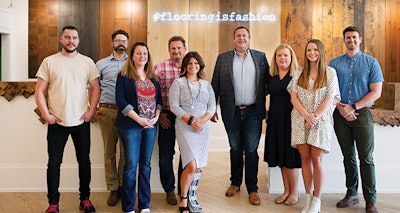
|
Year founded: 2004 Number of employees: 11 Locations: 2 Annual revenue: $6 million |
Andrew Denny is a storyteller. His medium is flooring.
His company, Textures Nashville, treats each custom floor as part of the larger story of the client's project.
"We're believers in creating unique content that tells a story," Denny says. "Flooring without context is just wood; it's beautiful, but what our clients really want to understand is how that material fits into what their vision is."
When Denny took ownership of Textures in 2016, he set out to provide something different.
"We try to go where the competition isn't," he says. The company evolved into a to-the-trade provider, and has begun building a luxury brand on the back of creativity. Approximately 80% of its revenue is hardwood flooring, with a team of experienced project managers for installations. Noticing some drawbacks to the prefinished flooring offered in their market, Denny decided to dedicate the company to providing clients with exactly what they wanted.
"We found a partner mill that gave us exclusivity throughout the Southeast and started working with them so we could create custom options for our designers, architects and luxury builders," Denny says. The venture's been paying off, and the company's been growing at a clip of about 50% annually ever since.
The company's success wouldn't be possible without the Textures team, Denny notes.
"I think foundational to building a team is people that care for one another," he says. "We're a small business, and we have found the best fit is people that love to have some freedom and enjoy a challenge. But the spirit of family is probably the most important attribute we look for."
The team draws its strength from a willingness to help one another, Denny adds, and the company hopes to strengthen industry partnerships in the same way. Textures' new showroom is situated in the Nashville Design Collective, a gallery filled with design and home building companies. Aside from building relationships with neighboring businesses, the company also shares its stories via its own podcast. It's recorded in a studio in their showroom and they invite other industry professionals as guests.
Denny plans to continue using the space to help other artists and businesses tell their stories, as Textures continues helping clients to tell theirs.
"Really make sure people understand your story and you understand theirs," Denny advises. Those are, after all, the kinds of stories that have a happy ending: "If you have a spirit to serve and want those other partners to be successful, the natural byproduct is going to be your own success."
Fall Design | Pleasanton, Calif.
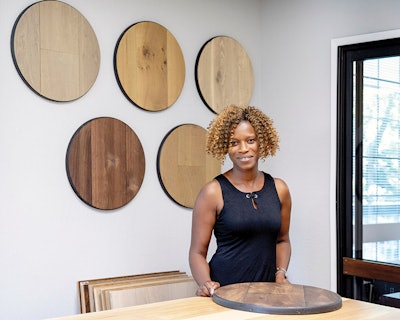
|
Year founded: 2010 Number of employees: 2 Locations: 1 Annual revenue: $2.5 million |
Rose Fall doesn't play it safe.
When she has a vision for something, chances are she will find a way to bring it to life. She once created an entire custom flooring line because a company she'd ordered patina flooring from told her to wait eight weeks–then failed to deliver it.
"I was getting frustrated and I said, 'Why don't we make it our own?'" recalls Fall. "So that's how we started–we made it our own."
It's that attitude that helped springboard Fall's flooring career. Born in Senegal and raised in France, Fall moved to California as a young adult and followed her passion for color, texture and shape into an education in graphic design. An internship introduced her to the wood flooring industry, and she ended up with a job in the design center at a large hardwood flooring distributor soon after.
After 10 years of growing her knowledge and reputation in the trade, Fall took her biggest professional risk yet: She went out on her own.
"It was just when I had my second child, so it was pretty scary, because I'd just left a big company," she says. "Fortunately, there were a lot of people that wanted to support me, and I am so grateful for them."
Fall's clear vision and personalized one-on-one attention to every project she takes on helped her business flourish, and it has kept clients referring and coming back, says Carina Sharer, Fall's assistant.
Fall chose a co-op for women in the home industry to site her showroom, which is by appointment only. There she displays hand-selected options for clients based on budgetary restrictions and personal style. Approximately 80% of her company's revenue comes from hardwood flooring, and she teams up with a network of installers for projects.
Fall has also continued to create her own custom wood flooring lines, each of them inspired by her own life journey. Her "Warm Colors of Africa" collection, for instance, was inspired by the place of her birth.
"I have always been inspired by diversity and different cultures, and approach flooring with a global lens," Fall says.
Now 10 years into her business and boasting a strong list of relationships and clientele, Fall, as usual, has no intention of getting too comfortable.
"I am proud of what I have achieved so far, but I also know that my adventure is far from over," she says. "I find myself just as passionate about the possibilities in hardwood floors now as when I started 20 years ago, and my desire is to become even more of an innovator in the next decade."
Exclusive Floors Ltd. | Surrey, B.C.
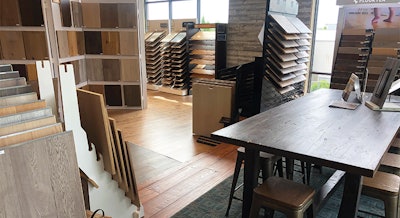
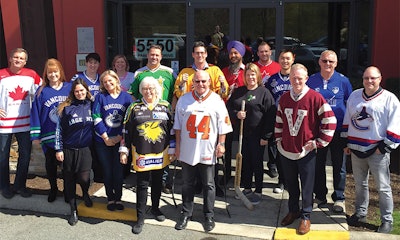
|
Year founded: 1979 Number of employees: 110 Locations: 3 Annual revenue: $50 million |
Since its beginnings as a one-man carpet shop more than 40 years ago, Exclusive Floors has been laying the groundwork for its booming success today. It's done that by sticking with the same core philosophy throughout the years: "Be good to people, do great work, and invest in our business."
VP Mark Taylor joined the company 10 years ago after Exclusive founder Jack Davids sold the business to his son, Jason, back when the company had 26 employees and one location. About 26% of the company's revenue is hardwood flooring; it also offers tile and carpeting. The company works with both builders and homeowners and has a team of nearly 200 subcontractor installers.
"We invested in people. That's where most of the growth came," Taylor says. "And if you get the right people, then they go and network and find good clients and your business grows."
Part of that investment in people has been the addition of a full service department with inspectors and technicians to handle inspection issues that used to be dealt with by the company's sales reps.
Lasting client relationships have been the backbone of the company since its founding, and Exclusive has become known for its annual golf tournament, as well as fishing trips with partners.
The company takes similar measures with its employees, hosting golf outings, casino trips, lunches and go-kart nights in the spirit of building relationships among its teams.
"The best thing for employee retention is to hire well," Taylor says. "The other part we do is creating a work environment that's positive."
Despite the larger size of the company, Exclusive avoids a "corporate"-feeling environment by having open communication, which starts during training.
"It's nice to develop people, whether they're young or old, where you hire them and they grow into their position," Taylor says. "And becoming friends along the way, that's fantastic."
The company is looking at a record-setting year of invoicing this year, and as it continues full-steam ahead in its growth, it plans to continue to do so the way it always has: by investing in people.
"It goes back to our vendors; we treat them like a partner, we treat our customers like a partner and our staff like a partner," says Taylor. "It's hard work for everybody, but it's enjoyable when you do it with good people."
Retail in the time of COVID-19In light of the COVID-19 pandemic and its impact on the industry and the world, in June we asked our 2020 Outstanding Retailer Award winners what their experience has been since the pandemic began, and how they are handling the crisis.
Clara Olguin I think we were mostly slower than normal. We were not at the same level that we were last year in March. But we have a great group of advisors at our table that support us. We have our banks that really guided us through the Paycheck Protection Program. We're grateful for that. We are definitely looking for either a second round, or would love to see how much flexibility there is for this, because it was confusing. We are partially open. The showroom is still open just by appointment. I think our clients found this better, because they can be by themselves, they can bring their kids, they feel safe. We've been able to do a lot of empty homes. We're very blessed to have the opportunity to continue working. We have seen other businesses close their doors forever. So we are blessed. But working from home with four kids, believe me—not easy. With COVID-19, for small businesses, for finances, it's going to be tough. It's going to be hard. We are a service company, so coming to our clients at this time, it's not easy. everybody's sensitive. More places are opening, but we know there is a concern and we want to respect that and we want to be able to offer more. I think that the challenge that we face is to use more technology. In the type of industry that we are, there's just not that much technology. We have to start looking at the [room] visualizers. But sometimes with wood, you have to touch it. You have to feel it. It's a live piece of wood. So it is going to be hard and I think we need to start developing a cheaper process faster so we can send samples. But I think that's what we are facing, to begin using more technology and developing new technology.
Andrew Denny We shut down for about two weeks and then during those two weeks we did video pretty much exclusively for client meetings. Then we were deemed "essential" by the state in a couple different categories, and we moved to an appointment-only set up. But we have not seen much of an impact at all. As a matter of fact, we've never been busier. That said, there's still a lot of uncertainty. To this point, we've never been busier. Who knows what tomorrow holds? The best thing that we can do as a team is put on blinders, put our heads down, innovate and executive and work harder than we've ever worked before. As luck would have it, starting in late Q4 of 2019, we started investing in ways to connect with people online. Part of that was a virtual showroom. So after the pandemic hit, I called a videographer and said I needed a way to get the virtual showroom activated. And within a week, we had that on our website. So that was borne out of necessity. We decided that every six months we will do a new version of that so that our content is always fresh and accurate. So when we're on a video conference, we can take control of the screen and walk them through the options just as if we were there. But it's one of the lessons we learned through the pandemic—that we provide our clients a service that saves them time. That's one of the biggest things we have to do.
Rose Fall Once the pandemic happened, we were able to activate our Room Visualizer on a Zoom meeting with clients and gave them the link so they can play with it after. Pretty much we were busy every day. I was able to work. I don't think I had two months where I was really relaxing. I was working on strategies, different things, how to improve. We're wearing masks all the time in the showroom, and gloves once in a while. The hand sanitizer is always there. Carina Sharer: We had to do a lot of background stuff and come up with a plan if someone is coming to a house, you know, safety measures. I think that's been a little different. But I think a lot of people are also spending a lot of time at home, so they kind of look around and they want to make changes.
Kim Russ Missouri's rules were basically that we were considered "essential workers." So we never had to close. We had two weeks probably of 'Oh no, people are canceling,' at the height of it. And then we made our showroom by appointment-only, just so that we were able to monitor how many people were walking in and things like that. But for the most part, we've stayed open and we've been able to keep everybody with a job, which is the most important part for us. We sanitize the whole showroom and people can shop how they feel comfortable. Most have worn their own masks in, and we will wear masks. In homes and on construction sites, we've worn more gloves, more masks. But luckily, for the type of work we're doing, we're only in the part of the house that's really under construction. So it's not been bad. People have been understanding about the limitations of everything we're able to do. They're letting us into their homes so they know that there's obviously a little bit of a risk.
Mark Taylor Our retail business dropped—walk-ins dropped 75% immediately. The builder side slowed down but it was still going, so that helped us. The retail side was impacted pretty hard. It's since returned to normal. We actually had a really good month last month [May], and this month is looking good again. So it lasted about 8 weeks for us, that impact. We started to work on old quotes, following up on every old quote, working on those. Surprisingly, people who hadn't lost their jobs were still interested in our service. In our stores, we use masks and gloves and plexiglass holders, and have limited the number of people in the store. For a while it was locked completely. Right now we locked the back warehouse; those are all locked so installers come to the door, call a number, and the material is brought out to them to reduce the contact. We also do most of the normal things, like people who are sick can't come to work. But the big one's the showroom. We've got laneway traffic now, so some of the aisles you can only go a certain direction on if it's busy. The main store has more than 50 people in it, so we have to have some of the salespeople doing shifts. They work one week in and one week out to keep the number of people in the building from being too much. One thing we've done is, at 11:30 a.m., all the managers' alarms go off and everybody drops what they're doing (unless they're with a client) and starts cleaning and then takes it off the checklist. So you have everybody buying in, saying "I'll do this section." It's teamwork. And then because they're doing it themselves, they're also realizing how important this is. So we kind of view it as that way to get a culture of clean and safe. We have a cleaner who comes in first thing in the morning and does it. But this way by doing a second one in the day, you get the buy-in from the staff and they feel a bond, like they're working together on the solutions. |
Retailers talk diversity in the industryIn light of the ongoing discussion of race and diversity happening around the globe, we asked our winners if they would like to share their thoughts about diversity and their businesses.
Rose Fall As a woman of color, mother and someone in the home industry, the road to running a business hasn't been without challenges, but my goal is always to try and take any opportunity I can personally and through my business to represent and celebrate my Senegalese heritage. I'm also hopeful about the potential positive changes that current conversations could present. My personal belief is to always shine a light on the beauty of diversity. I love to incorporate my African culture into different aspects of my business; for me, most of all, it's a way to express my nostalgia and pride creatively and to share that piece of myself with the world.
Andrew Denny At Textures Nashville, inclusion is a bedrock of our culture, and we celebrate our differences. We view diversity as a real value for the company and our clients. Our experience has taught us that our best ideas are born from different perspectives and backgrounds yielding stronger and more creative ideas.
WFB had a longer discussion with Clara Olguin of CIC Floors about her experience as a woman of color in the retail flooring industry. Below is a transcript from that discussion, edited for clarity:
What challenges do you feel people of color face in the industry? I have heard a lot of stories from people who have tried to grow in the flooring industry or the construction industry, but just because of their color, they have not moved from installation or they have not moved from the warehouse, and have not been able to grow in what they do. Some of them have wanted to be in sales, but they have not been able to grow. I know that it's not something you see all the time, but I have to say that some people have these experiences. And I just want to say that in our environment in CIC Floors, we try to promote diversity. I'm a woman of color, I'm coming from Latin America and I experienced discrimination myself when I moved to the United States as an immigrant. So I know that the flooring industry is so diverse, but I know that others have experienced it, and I empathize with them. We know, as owners of a business, that we are looking for diversity. We are looking to bring the community together to serve the purpose of a client's needs. It doesn't matter your race, your color, your religion, we always try to embrace the industry in general. Because everybody has different talents and it doesn't matter where you're coming from or what your background is. However, we have suffered and it is sad to see how people get a business or don't get a business because of their color. If you're a woman, if you're a minority, it's hard. Have you experienced discrimination being a person of color in the flooring industry? Atlanta is very diverse, and I have to say that the discrimination in the construction industry is not as clear because a lot of people of color are in the construction industry. So I'm not going to say that I have suffered myself in Georgia, but I know that others have suffered and I have heard a lot of stories from other people. So I try my best in my company not to have the same thing happen to others and I try to support diversity as much as I can. We are registered with the Chamber of Commerce and also the Hispanic Construction Association, and we all try to get together hand-in-hand to promote diversity. What changes would you like to see in the industry to make it a more inclusive place for people of color? I think that the labor cost should be the same across the board based on the experience of that installer—the expertise that that person or that company has. There shouldn't be any discrimination on the principles of installation or the construction industry. That's what I would love to see, in general. There are also not that many women in the flooring installation business. I would love to see more women learning the art of installing floors. |
RELATED: Retail Excellence: The Winners of the First WFB Outstanding Retailer Awards










